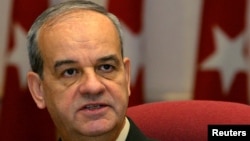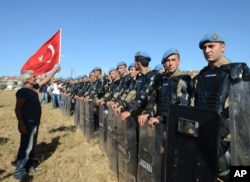ISTANBUL —
An Istanbul court has sentenced senior generals, journalists and politicians to long jail terms for an alleged conspiracy against Turkey's Islamist-rooted government. The case is the culmination of a decade-long conflict between Prime Minister Recep Tayyip Erdogan and the country's secularist establishment.
* Lead suspect in the trial, former brigadier general Veli Kucuk, sentenced to life in prison
* Dozens of military officers, politicians, academics and journalists received long jail terms
* 275 accused of military coup plot against PM Erdogan's government; 21 acquitted; appeals expected
* Defendants accused of membership in "Ergenekon," clandestine organization that allegedly planned, encouraged criminal acts such as extrajudicial killings, bombings and assassinations, to pave the way for coup
* Five-year trial exposed deep tensions between the Turkey's secular elite and Erdogan's Islamist-oriented Justice and Development Party
The former head of Turkey's armed forces, retired General Ilker Basbug, was sentenced Monday to life in prison. The court ruled he was part of a terrorist conspiracy called Ergenekon that sought to overthrow the government. Many of the 275 defendants on trial were also convicted of involvement in the plot and were sentenced to years and even decades in jail.
ERGENEKON FACTBOX
* Former chief of Turkish staff, retired general Ilker Basbug, and at least 10 others sentenced to life in prison* Lead suspect in the trial, former brigadier general Veli Kucuk, sentenced to life in prison
* Dozens of military officers, politicians, academics and journalists received long jail terms
* 275 accused of military coup plot against PM Erdogan's government; 21 acquitted; appeals expected
* Defendants accused of membership in "Ergenekon," clandestine organization that allegedly planned, encouraged criminal acts such as extrajudicial killings, bombings and assassinations, to pave the way for coup
* Five-year trial exposed deep tensions between the Turkey's secular elite and Erdogan's Islamist-oriented Justice and Development Party
The vast majority of those jailed were senior army officers. But journalists, academics, businessmen and politicians, including three opposition members of parliament, were also among those convicted. Twenty-one others were acquitted.
The convictions were handed down in a courthouse at the Silivri prison complex near Istanbul. Strict security measures were enforced around the site, with all access roads sealed off. The governor of Istanbul province banned protests outside the courthouse, and police using water cannon and tear gas dispersed crowds protesting against the trial.
Oktay Vural, deputy chairman of the opposition National Action Party's parliamentary group, condemned the convictions.
"What we seek is fairness and justice," he said, "but what we see today, unfortunately, is that this process has turned into a political game. It is such a pitiful picture that the former head of the Turkish army is tried as the head of a terrorist organization," he added.
The five-year trial has divided public opinion, with critics accusing the government of using the case to silence its critics, while the government insists it is crucial to establishing civilian rule. The Turkish military has ousted four governments since 1960.
Ever since Prime Minister Erdogan’s Islamist-rooted AK Party came to power in 2002, tensions have been high with the army, which sees itself as guardian of the secular state.
The case was opened following the discovery of an arms cache in a suburb of Istanbul. The trial was initially heralded as ending the military’s meddling in politics and enjoyed broad support. But concern over the case has steadily grown as the number of defendants, many of them well-known critics of the government, has increased.
The European Union and the U.S. State Department, along with international human rights groups, have voiced concern over the handling of the case. The government has rejected such misgivings, claiming the case is ushering in a new era of democracy. Critics argue that the case symbolizes the replacement of one authoritarian rule with another.
With those convicted expected to appeal, the controversy is unlikely to end soon.





